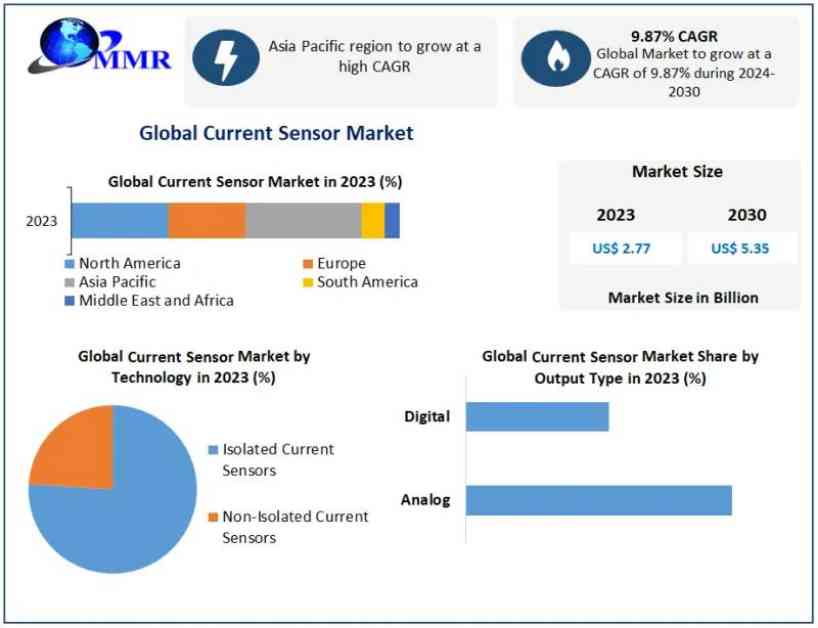The Current Sensor Market is on the rise, with a projected CAGR of 9.87% by 2030. The market, valued at USD 2.77 billion in 2023, is expected to reach around 5.35 billion USD in revenue by 2030. This growth is driven by the increasing demand for devices that measure and convert electric current into proportional signals for various applications like ammeters, data acquisition systems, and control mechanisms. These sensors are crucial in monitoring electrical flow, especially in sectors such as automotive, industrial automation, and consumer electronics.
Key drivers fueling the growth of the current sensor market include the rise of electric vehicles (EVs) and the expansion of the Internet of Things (IoT). Governments worldwide are encouraging EV adoption, leading to a surge in demand for current sensors that enhance battery management and optimize vehicle performance. Additionally, the IoT revolution is driving the need for low-cost, efficient sensors to monitor electrical consumption and performance in smart devices across industries.
The market is witnessing trends such as the increasing integration of smart technologies and the shift toward renewable energy solutions. Industries are focusing on energy efficiency and sustainability, leading to a growing emphasis on using current sensors to monitor and optimize energy consumption. Advancements in sensor technologies, such as Hall-effect and shunt sensors, are improving measurement accuracy and reliability.
Opportunities for growth in the current sensor market exist in sectors like automotive, healthcare, and industrial automation. The transition to electric and hybrid vehicles presents a significant avenue for sensor manufacturers to innovate and meet the specific needs of EV systems. The increasing adoption of IoT devices across industries highlights the demand for reliable current monitoring solutions. Companies that can develop tailored products to leverage these trends may capture substantial market share and drive future growth.
In terms of regional dynamics, the Asia Pacific region leads the current sensor market, driven by robust demand from the automotive, industrial, and consumer electronics sectors. North America and Europe are also experiencing growth, with significant contributions from industrial applications, consumer electronics, and the automotive and medical industries. Each region presents unique opportunities and challenges based on diverse applications and requirements for current sensors.
The market offers a variety of segmentation options, including current sensing method, loop type, technology, output type, and end-user industries like automotive, consumer electronics, healthcare, industrial, energy & power, and others such as aerospace & defense, railways, and building automation.
Overall, the current sensor market is poised for significant growth, driven by technological advancements, increasing demand from key industries, and the shift toward energy efficiency and sustainability. Companies that can innovate and adapt to these trends are likely to succeed in this evolving market landscape.

